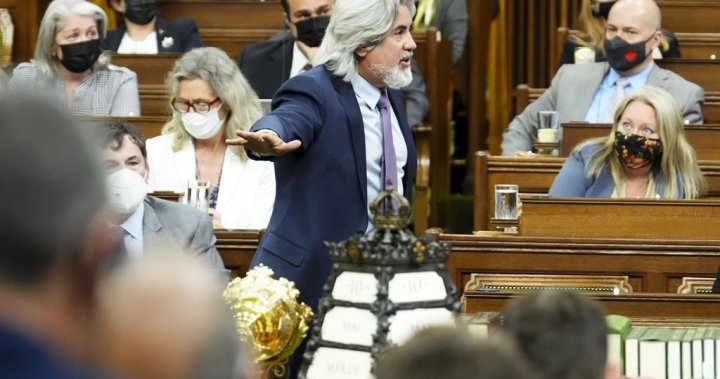Canadian programming will see at least $1.B a year from online streaming bill: minister – National | Globalnews.ca
The online streaming bill will generate at least $1 billion a year for Canada‘s creative sector, including Indigenous programs, Heritage Minister Pablo Rodriguez told a committee of MPs on Monday.
Rodriguez disclosed the figure before the House of Commons heritage committee, which is studying a bill updating broadcasting laws and applying them to streaming services such as Netflix and Disney Plus.
Rodriguez said some of the money would go toward supporting productions by Indigenous and minority communities, as well as French productions from Quebec.
Read more:
Canadian creators could lose global revenue with new streaming bill, YouTube warns
The Heritage Department originally said the online streaming bill would generate around $830 million a year by making streaming services fund Canadian creative work, as traditional broadcasters do now.
Rodriguez said the sum would exceed $1 billion because— since his department made its original calculation— more people have subscribed to streaming platforms, such as Netflix.
More platforms, including Disney Plus, have also come to Canada and they have become more and more popular during the COVID-19 pandemic.
He said some of the funds would support diverse programming, including in French.
“We will want to be able to hear more diverse voices. We want to hear Indigenous voices more. Maybe we can do it with a mandatory provision. Maybe we can find other ways to do so— and looking at official languages as well, and perhaps other languages,” he said.
“The money will go toward these objectives and it will be upwards of $1 billion a year.”
Read more:
Liberals aim to quell free speech concerns with new Online Streaming Act
The minister said “strengthening provisions to help Indigenous Peoples and racialized Canadians” in the bill was one of the “great ideas” he had heard discussed in committee.
MPs heard that the bill would also put an onus on some platforms to carry channels like OutTV, which screens LBGTQ shows and movies.
At an earlier hearing of the committee, OutTV said some of the big foreign streaming platforms had refused to carry the channel and had told them there would not be a demand, which OutTV disputed.
Peter Julian, the NDP heritage critic, who highlighted the issue of OutTV at the committee, said the $1 billion a year was a “significant sum.”

Kevin Waugh, a Tory committee member, expressed surprise it was so large and asked for further details of how it had been calculated.
Thomas Owen Ripley, associate assistant deputy minister at Canadian Heritage, said some of the $1 billion could be used to support Canadian productions including dramas, documentaries and children’s programs.
Ripley said that “just over $900 million” a year would come from “expenditure requirements” in the bill making streaming platforms such as Netflix spend a certain percentage of their revenue on Canadian productions, as traditional broadcasters do now.
He said traditional Canadian broadcasters currently spend just under $3 billion a year on Canadian programs, which includes news.
Ripley said Netflix already has a “huge amount of production activity” in Canada, but “most of it would not currently qualify as a Canadian program,” under the current definition.
“Part of the impetus behind this bill is to get them to do more on the Canadian side,” Ripley said, including involving more “Canadian creatives” and telling “more Canadian stories.”
Read more:
What’s a Canadian film? Regulator to define if new online streaming bill passes: minister
Rodriguez has said he will ask the Canadian Radio-television and Telecommunications Commission (CRTC), the country’s broadcasting regulator, to modernize the definition of what would qualify as Canadian content, including a film or TV show, after the bill has passed.
The minister, in often tense exchanges with Conservative MPs, reiterated his assertion that the online streaming bill will not affect people who upload videos to YouTube.
Rodriguez said the CRTC had “zero” interest in regulating millions of people’s posts.
The minister said the bill would not cover user-generated content and would only cover commercial material. When the bill was launched, Rodriguez said this could include a professional video streamed on Spotify that also appears on YouTube.
Rodriguez faced persistent questions from Conservative MPs about the definition of “commercial” content with Rachael Thomas, MP for Lethbridge, repeatedly demanding he put a figure on it.
“What’s the revenue threshold? Who’s in, who’s out?” she demanded, accusing the minister of failing to answer her questions.
Rodriguez’s appearance is the second at the committee. Last week, he was forced to leave before being given a chance to speak while Tory and Liberal MPs argued about procedural issues, accusing one another of delaying tactics.
© 2022 The Canadian Press
For all the latest entertainment News Click Here




